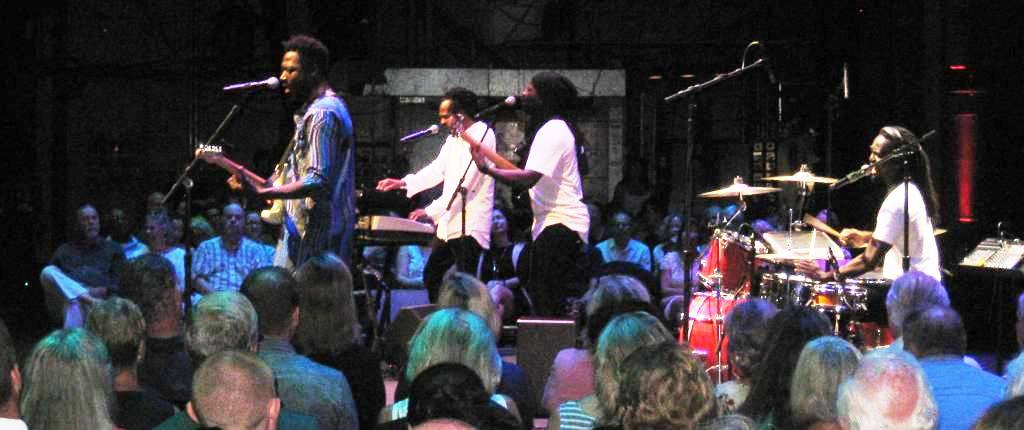 We were upstate, visiting our daughter. Laura had three tickets for a concert in the park in Saratoga Springs – a group from Chad, now living in Montréal. It was the last night in a Monday summer series -- called On Stage, because the chairs were on the stage of the large outdoor theater, an intimate setting for a few hundred people. Four musicians, known as H’Sao-* -- three Rimtobaye brothers, Caleb (guitar), Mossbass (bass) and Izra L (keyboard), and their childhood friend, Dono Bei Ledjebgue (percussion) -- blended in intricate harmony, went off on solo riffs. We caught bits of French, bits of English, and a lot of their tribal language. The longer they played, the more we realized we were hearing a cri de coeur, a call from the heart – the life of the immigrant, trying to stay alive, seeking less dangerous corners of the world. They have been in Montreal since the turn of the century, but have never left home. One song, “For My Family,” began with drummer Dono Bei, rapping about waiting for a bus in Montreal, at 5 in the morning, reading a postcard from home, a cousin asking him to send him a car. The audience chuckled, but Bei’s piercing voice let us know this was serious business: “You wanna make it happen so badly for your family, “You keep digging, you keep digging.” “I got ten brothers left behind, “Their scholarships are all on me.” The music was beautiful; it came from deep. One of the brothers explained why they had left home – childhood friends were having to choose between Christianity and Islam, with apparently ominous results. Their voices blended: “I do this prayer to whoever’s up there, “Jehova, Jesus, Allah, we need an answer.” At times the group reminded me of the tight, intuitive “Buena Vista Social Club” from Cuba and at times it reminded me of the plaintive voice of Bob Marley cutting through the ozone. I thought I heard some of the South African chords Paul Simon incorporated into “Graceland” and at times I heard Sam Cooke on “A Change Is Gonna Come.” But mostly I heard these four brothers from Chad and Montréal, trying to work it out. The musicians teased us: How do you know you are alive? Somebody in the audience said, “Because we are moving.” Exactly, the musician said. Prove you are alive. Get up and dance. Many people did; Laura stood up, made eye contact with Caleb, the closest to us, letting him know she was very into their music. They wailed, they rapped, they talked about love. They told a tale about a rite of manhood, going into the wilderness to confront a lion. (The band used to be bigger, or so they claimed.) They prodded us to sing a chorus, in their tribal language. One band member chided us: we didn’t know what the words meant, did we. Something not very nice, he suggested. After 90 minutes, on this balmy upstate evening, we were part of the rhythm, part of the harmony, part of the sadness, part of the joy, the front pages of the papers and the news on the television, immigrants drowning, Rohingya being slaughtered, children being ripped from their parents on the U.S. border. After the show, the musicians stayed around, chatting softly, giving hugs. Dono Bei said the band was heading to Montreal in the morning; my wife and I would return to New York a day later. “Bonne retour,” he said. Good return. We bought all three of their CDs and rocked with them all the way down the Northway. When I got back to my laptop, I looked up their site: https://hsao.ca/en/ The group has been discovered by the Canada Council for the Arts, has performed in Canada, the U.S., Europe, Australia and also New Zealand with its rich cultural programs. But they have not been in New York since a visit to Lincoln Center in 2017. I went poking around for a video: the first one that popped up showed them in choir robes, in a cathedral (see below.) Exactly, my wife said. They are immensely spiritual. Messieurs: quand allez-vous jouer à New York?
* -- H'Sao means the Swallow of the Sao, the people who were the ancestors of present-day Chadians. The group's origin is presented in its name: the musicians in H'Sao come from N'Djamena, the Chadian capital, a vast country located between the Maghreb and sub-Saharan Africa. -- www.festivalnuitsdafrique.com/en/artist/h’sao
Mendel
9/4/2018 07:38:25 am
Magical. Tapping my feet now at the National Library of Israel in Jerusalem. Caught the guy next to me peeking at my screen.
bruce
9/4/2018 02:25:08 pm
george,
Altenir Silva
9/4/2018 03:04:04 pm
Dear George: Wow! The band is great. I liked to know the rap regarding the cousin dreaming about the car. It is very significative on the immigrants. The family members that stay in their poor countries create a false image from those that go away from home. Actually, they wish and dream that their relatives have found the promised land.
George Vecsey
9/4/2018 08:17:31 pm
Tom, thanks for the response.
bruce
9/5/2018 02:31:18 am
altenir,
Altenir Silva
9/5/2018 01:00:41 pm
Dear Bruce,
George Vecsey
9/5/2018 02:48:27 pm
It's horrible. I've never been there. I don't know much more about Brazil than Pele and Socrates, Tom Jobim and Caetano Veloso, but I am gutted at the loss of so much patrimony
bruce
9/5/2018 02:57:24 pm
george,
Altenir Silva
9/5/2018 03:08:19 pm
Thanks, George! 9/6/2018 01:06:17 pm
It is always great when you can be up close and personal with performers. It takes me back to Gerde’s Folk City and the other small clubs in the Village in the late 50’s and early 60’s when you were usually no more than a few feet from the performer. Comments are closed.
|
Categories
All
|









